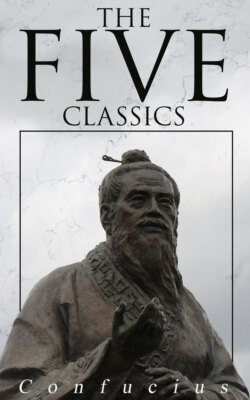Читать книгу The Five Classics - Confucius - Страница 55
На сайте Литреса книга снята с продажи.
ОглавлениеHexagram XXXIX.39 Kien
Table of Contents
In (the state indicated by) Kien advantage will be found in the south-west, and the contrary in the north-east. It will be advantageous (also) to meet with the great man. (In these circumstances), with firmness and correctness, there will be good fortune.
1. From the first line, divided, we learn that advance (on the part of its subject) will lead to (greater) difficulties, while remaining stationary will afford ground for praise.
2. The second line, divided, shows the minister of the king struggling with difficulty on difficulty, and not with a view to his own advantage.
3. The third line, undivided, shows its subject advancing, (but only) to (greater) difficulties. He remains stationary, and returns (to his former associates).
4. The fourth line, divided, shows its subject advancing, (but only) to (greater) difficulties. He remains stationary, and unites (with the subject of the line above).
5. The fifth line, undivided, shows its subject struggling with the greatest difficulties, while friends are coming to help him.
6. The topmost line, divided, shows its subject going forward, (only to increase) the difficulties, while his remaining stationary will be (productive of) great (merit). There will be good fortune, and it will be advantageous to meet with the great man.
Footnotes
39. Kien is the symbol for incompetency in the feet and legs, involving difficulty in walking; hence it is used in this hexagram to indicate a state of the kingdom which makes the government of it an arduous task. How this task may be successfully performed, now by activity on the part of the ruler, and now by a discreet inactivity:--this is what the figure teaches, or at least gives hints about. For the development of the meaning of the symbolic character from the structure of the lineal figure, see Appendixes I and II.
The Thwan seems to require three things--attention to place, the presence of the great man, and the firm observance of correctness--in order to cope successfully with the difficulties of the situation. The first thing is enigmatically expressed, and the language should be compared with what we find in the Thwan of hexagrams 2 and 40. Referring to Figure 2, in Plate III, we find that, according to Win's arrangement of the trigrams, the southwest is occupied by Khwăn ( ), and the north-east by Kăn ( ). The former represents the champaign country; the latter, the mountainous region. The former is easily traversed and held; the latter, with difficulty. The attention to place thus becomes transformed into a calculation of circumstances; those that promise success in an enterprise, which should be taken advantage of, and those that threaten difficulty and failure, which should be shunned.
This is the generally accepted view of this difficult passage. The Khang-hsî editors have a view of their own. I have been myself inclined to find less symbolism in it, and to take the southwest as the regions in the south and west of the kingdom, which we know from the Shih were more especially devoted to Wăn and his house, while the strength of the kings of Shang lay in the north and east.
'The idea of "the great man," Mencius's "minister of Heaven,"' is illustrated by the strong line in the fifth place, having for its correlate the weak line in 2. But favourableness of circumstances and place, and the presence of the great man do not dispense from the observance of firm correctness. Throughout these essays of the Yî this is always insisted on.
Line 1 is weak, whereas it ought to be strong as being in an odd place. If its subject advance, he will not be able to cope with the difficulties of the situation, but be overwhelmed by them. Let him wait for a more favourable time.
Line 2 is weak, but in its proper place. Its correlation with the strong 5, and consequent significance, are well set forth.
Line 3 is strong, and in a place of strength; but its correlate in 6 is weak, so that the advance of its subject would be unsupported. He waits therefore for a better time, and cherishes the subjects of the two lines below, who naturally cling to him.
Line 4 is weak, and, though in its proper place, its subject could do little of himself. He is immediately below the king or great man, however, and cultivates his loyal attachment to him, waiting for the time when he shall be required to act.
Line 5 is the king, the man great and strong. He can cope with the difficulties, and the subjects of 2 and the other lines of the lower trigram give their help.
The action of the hexagram is over; where can the weak 6 go forward to? Let him abide where he is, and serve the great man immediately below him. So shall he also be great;--in meritorious action at least.
